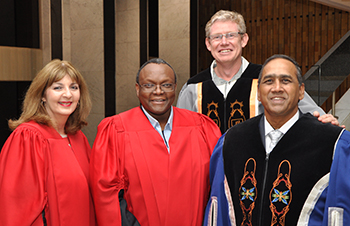Latest News Archive
Please select Category, Year, and then Month to display items
18 September 2018
Photo Hanno Otto
 The OSM Camerata is once again a winner, sharing the first prize in the Ictus International Music Competition with the Oklahoma State University.
The OSM Camerata is once again a winner, sharing the first prize in the Ictus International Music Competition with the Oklahoma State University.
If Einstein’s string theory had a musical undertone, one would think it is because of the sweet melodies of the Odeion School of Music Cameratas’ (OSMC) violins and cellos. It should therefore come as no surprise that OSMC won the 2018 International Ictus Music Competition, again. The ensemble has been paving the way to numerous successes since its inception in 2012.
This year, however, the OSMC is sharing the first prize with the Oklahoma State University Symphony Orchestra, under the direction of Dr Thomas Dickey. The OSMC’s competition recital for 2018 was conducted by principle conductor, Xavier Cloete. Acclaimed violist Elsabé Raath, joined the OSMC artistic team in 2017 as string clinician.
OSMC the jewel in crown
The OSMC is based at the Odeion School of Music (OSM) at the University of the Free State UFS) and was strategically founded as the OSM’s flagship ensemble with the main objective, creating a catalyst for excellence. “From a pedagogical perspective, it serves as a feasible incubator to nurture fully-rounded musicians who are thoroughly prepared for the demands of their trade as orchestral musicians, soloists and conductors,” said Marius Coetzee founder of the OSMC.
“Ms Raath also made her debut as conductor during the 2018 Ictus Music Competition where she conducted O Sacrum Convivium by Olivier Messiaen,” said Coetzee, founder of the OSMC. Elsabé was also conductor during the 2018 Ictus Music competition.
The OSMC’s concert programme for Ictus 2018 also consisted of works by Jacobus Gallus/Lance Phillip, Béla Bartók, Peteris Vasks/Keith Moss, as well as Johann Sebastian Bach.
Ictus an ideal platform
The Ictus International Music Competition is an online music competition for wind bands, orchestras and solo trumpet. It has been described by David Bilger of the Philadelphia Orchestra as “democratising music competitions”. Ictus was founded to make international music competitions more accessible though eliminating prohibitive travel costs, conference fees and visa issues. This was made possible through having the application and adjudication take place online only.
You can listen to OMSC Ictus submissions here:
Duo Seraphim Jabobus Gallus/Lance Phillip
Romanian Folk Dances/ Román népi táncok Béla Bartók
Kekatu Dziesma (Carnival Song) Peteris Vasks/Keith Moss
Prof Tim Murithi calls for Africa to design new global order
2016-06-02

From left: Prof Heidi Hudson, Head of Centre for Africa
Studies (CAS); Prof Tim Murithi, Extraordinary Professor
at CAS; Prof Lucius Botes, Dean of the Faculty of
the Humanities; and Prof Prakash Naidoo, Principal of
Qwaqwa Campus.
Photo: Stephen Collet
“What do Africans have to say about the remaking of the global order?” was the opening question of Prof Tim Murithi’s lecture which was hosted by the Centre for Africa Studies (CAS) of the University of the Free State (UFS) to celebrate Africa Day on 25 May 2016.
The annual Africa Day Memorial Lecture, entitled: Africa and the Remaking of the Global Order, doubled as Prof Murithi’s inaugural lecture. He is CAS’s newly-appointed Extraordinary Professor, as well as the Head of the Justice and Reconciliation in Africa Programme at the Institute for Justice and Reconciliation in Cape Town. He made a compelling argument for the need for Africa to exert an active influence on international narratives of peace, governance, justice, and reconciliation.
“If we are waiting for American leadership to get us out of the quagmire of a situation we are in, we will be waiting for a long time,” said Prof Murithi.
The Head of the Centre, Prof Heidi Hudson, concurred with Prof Murithi’s suggestion of devising African solutions for African problems. She quoted Audre Lorde’s well-known assertion that “The master’s tools will never dismantle the master’s house.”
Remembering 1963
Over five decades ago, on 25 May 1963, the Organisation of African Unity was formed, and was renamed the African Union in 2002. Africa Day marks this pivotal point in the continent’s history. On this day, we reflect on the continent’s journey into democracy, peace, stability and socio-economic development. It is also an opportunity to celebrate African identity and heritage.
Continent-building dialogues
The UFS Sasol Library celebrated Africa Day with a book launch. Facets of Power. Politics, Profits and People in the Making of Zimbabwe's Blood Diamonds by Tinashe Nyamunda is a reflection of some of the challenges that Zimbabwe continues to face. It details the disadvantaged position which the country finds itself in due to greed, maladministration, and corruption, despite possessing large deposits of minerals.
In celebration of Africa Month, CAS has held a series of lectures by esteemed scholars from across the globe. Earlier in the month, Prof Henning Melber presented lectures on Namibia’s independence and the African middle class. Kevin Bloom and Richard Poplak unpacked the issues surrounding Africa’s continental shift, while Prof Joleen Steyn Kotze focused on the possible fall of the African National Congress.